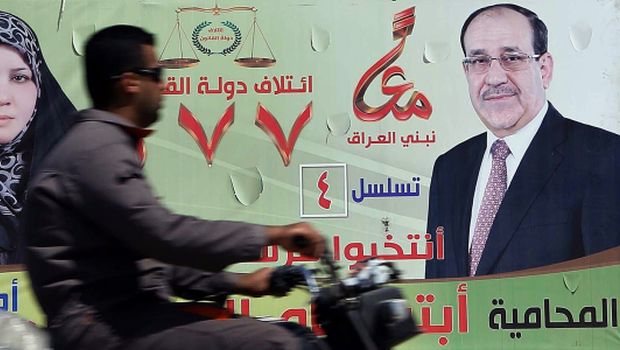
A man rides his motorbike past a large election campaign banner showing Iraqi Prime Minister Nuri Al-Maliki (R) along a street in the central Shi’ite Muslim shrine city of Karbala on April 6, 2014. (AFP PHOTO/MOHAMMED SAWAF)
Baghdad, Asharq Al-Awsat—Rival political parties in Iraq traded accusations of politicizing the security crisis on Wednesday, one week ahead of legislative elections and amid reports that a suicide attack south of Baghdad killed at least 10 people.
Iraqi Prime Minister Nuri Al-Maliki accused his rivals of seeking to place “obstacles” in the government’s counter-terrorism plans while Parliamentary Speaker Osama Al-Nujaifi, head of the Sunni-led Moutahidoun Coalition, accused Baghdad of allowing the unrest in the restive western province of Anbar to continue in order to disrupt the electoral process in Sunni-majority areas.
The latest electoral wrangling comes as Iraqi authorities reported that a car bomb exploded at a police checkpoint at the entrance of the city of Hillah, 62 miles (100 kilometers) south of Baghdad, killing at least 10 people, including four police officers, and wounding 18.
Violence has intensified in Iraq ahead of the April 30 elections. The UN reports that 8,868 people were killed in 2013, while more than 1,400 people were killed in the first two months of 2014.
In his Wednesday weekly address, Prime Minister Maliki stressed that Baghdad is committed to confronting the “plight of terrorism,” adding that the military is securing victories against the Islamic State of Iraq and Syria (ISIS) fighters that have taken over major cities in Anbar. He said that local tribes are cooperating and coordinating with the Iraqi army to drive the “terrorists” out of the province, parts of which they have effectively controlled since December 2013.
In an official statement also issued on Wednesday, Nujaifi raised questions about the government’s ability to deal with the situation in Anbar, calling on Baghdad to take urgent action to peacefully resolve the conflict. He criticized the Maliki government for failing to take the situation in Anbar seriously, adding that he was in contact with UN Secretary-General Ban Ki-moon and various Iraqi ministries, which he said were working together to resolve the Anbar crisis.
Moutahidoun Coalition member Essam Al-Obaidi also accused Maliki of seeking to use the ongoing security crisis in Iraq to disrupt the election process. He told Asharq Al-Awsat: “The actions being taken by the government and military and security apparatus in and around Baghdad aims to disrupt the voting process in these areas which are dominated by a certain community,” a reference to Iraq’s Sunni community.
“All of these practices leading up to the leaders are a clear indication of plans to disrupt the elections and justify the actions of the government, including arbitrary arrests,” he added.
Maliki’s Shi’ite-led State of Law coalition and the Sunni-led Moutahidoun Coalition have differing interpretations of the Anbar crisis. The prime minister views the insurgents as foreign terrorists and has vowed to drive them out of the province, while Nujaifi and his allies view the conflict as a second stage of Sunni-led anti-government protests that began in late 2012.
“The government must take immediate action [in Anbar], including providing vital food and humanitarian aid to citizens, and exert every effort to end this problem before it develops into a real disaster,” Nujaifi said.
